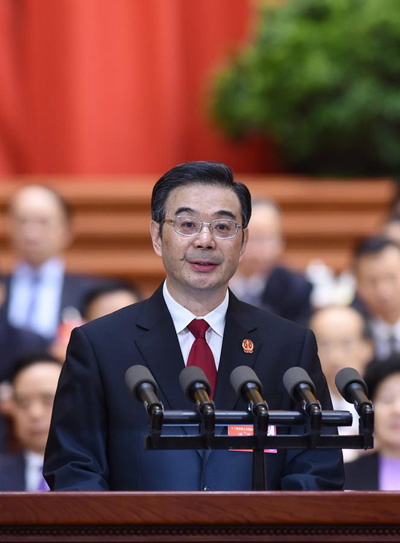 |
|
Zhou Qiang, president of the Supreme People's Court, China's top court, delivers work report to the fourth session of the 12th National People's Congress (NPC) and the 12th National Committee of the Chinese People's Political Consultative Conference (CPPCC) on Sunday. [Photo/Xinhua] |
BEIJING - A more efficient and fairer justice system has improved human rights protection in China with many wrongful convictions corrected, court proceeding streamlined and better protection of lawyers' rights.
The achievements were outlined in the work reports of the Supreme People's Court (SPC) and Supreme People's Procuratorate (SPP), which were submitted to the ongoing parliamentary session on Sunday.
"We tried our best to make sure every case processed through the judicial system was fair and justice was served," Chief Justice Zhou Qiang said when delivering the SPC work report to the National People's Congress (NPC).
The safety and wellbeing of women and children saw vast improvements. Chinese courts concluded the trial of about 5,400 cases involving the trafficking and sexual assault of women and children last year, with more severe sentences extended to the guilty parties, according to the SPC report.
Meanwhile, about 24,000 suspects were charged with violating the personal rights of women, the SPP report said.
CONSTRUCTIVE INTERACTION WITH LAWYERS
Prosecutors have strived for "constructive interaction with lawyers," said Procurator-General Cao Jianming, when delivering the SPP work report at the NPC session.
An online system to support defense lawyers was established, which helped them schedule appointments with their clients and file lawsuits, while a database of digital legal documents is available to 29 provincial divisions, helping lawyers access and survey documents easily.
In about 1,000 cases, prosecutors stopped authorities from hindering the work of lawyers.
This year, Zhou promised improvements to the legal aid system, to help those who want to appeal or review their death sentence.
PROCEDURAL JUSTICE
Courts have upheld the principle of innocence till proven guilty and worked to protect the legal rights of defendants, Zhou said, adding that a total of 1,039 suspects were found not guilty in 2015.
A number of high-profile wrongful convictions were corrected last year while the courts reviewed about 1,300 cases. One such case involved Chen Man, 53, who had spent 23 years in prison for murder and arson. Last month a court overturned his conviction after a 16-year appeal process.
"We have carefully reviewed the wrongful prosecutions in the past years and in the process have uncovered discrepancies in the arrest of suspects and lodging indictments," Cao said.
Moreover, the SPP is fine-tuning a mechanism to prevent and correct wrong cases, he said.
Prosecutors nationwide made significant efforts to ensure procedural justice. They lodged protests against about 6,600 criminal court rulings and about 3,500 civil rulings. They also pushed the police to drop about 10,000 cases and stop them from abusing their power and illegally collecting evidence in about 31,000 cases.
About 25,000 suspects were not prosecuted due to lack of evidence or facts to constitute a crime, according to the SPP report.
Prosecutors also tightened supervision on the police concerning compulsory measures on suspects. They called on the police to release or ease the custody of nearly 30,000 suspects.
The number of suspects, placed in custody for more than three years without being charged, reduced from 4,459 in 2013 to six by 2015.